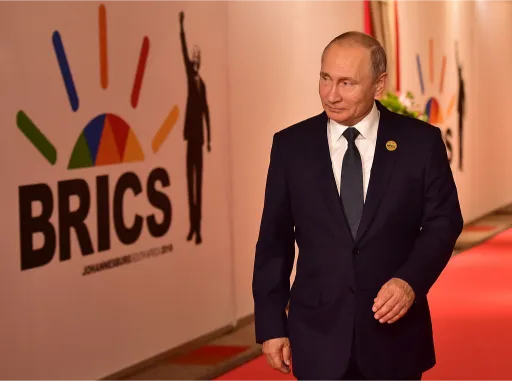Russian President Vladimir Putin is said to be using the 16th annual 2024 BRICS summit to demonstrate that Russia remains a global player with strong international ties, despite Western sanctions.
Putin last week hailed the “undeniable fact” of the BRICS’ growing economic and political clout, noting that it will lead to “bigger global influence.”
The BRICS meeting is seen as a key moment for Russia to reinforce alliances amid Western efforts to isolate Moscow following its invasion of Ukraine.
The 16th annual 2024 BRICS summit is currently taking place in Kazan, Russia from 22 to 24 October and consists of the namesake five countries of: Brazil, Russia, India, China, South Africa, as well as the first meeting for the new members: Egypt, Ethiopia, Iran and the United Arab Emirates.
Brazil, Russia, India, China and South Africa were first grouped together as rapidly growing major economies. Now they offer a political forum outside the West.
From the start, BRICS was devised as a counterweight to the West’s geopolitical and economic clout, which was embodied particularly through forums like the G7, and later the G8.
Russia’s war against Ukraine has sparked a humanitarian crisis for the Ukrainian people and upended global food and energy security.
Key agenda items include discussions on a BRICS-led payment system to challenge SWIFT and the ongoing war in the Middle East.
Indian PM Narendra Modi and Chinese President Xi Jinping were expected to attend.
Modi said his visit this week will seek to build on partnership with Russia agreed during his July trip to Moscow.
Presidents Luiz Inacio Lula da Silva of Brazil, Miguel Diaz-Canel of Cuba, and Aleksandar Vucic of Serbia will not be attending the summit.
Ukraine has criticized UN chief Antonio Guterres’ decision to attend after he declined Kyiv’s invitation to a June peace summit in Switzerland.
Ukraine’s foreign ministry said meeting Putin now “does not advance the cause of peace” and “damages the UN’s reputation.”
“The UN Secretary General declined Ukraine’s invitation to the first Global Peace Summit in Switzerland. He did, however, accept the invitation to Kazan from war criminal Putin,” the ministry said in a posting on X.
Much of the summit will deal with Ukraine.
US Secretary of Defense Lloyd Austin recently addressed arms for Ukraine as well as a strategy as winter approaches and the US election looms in early November.
Speaking at the Diplomatic Academy of Ukraine, Austin gave no hint of the US position on key parts of Ukrainian President Volodymyr Zelenskyy’s so-called “victory plan,” some details of which Ukraine released last week.
The Ukrainian president has promoted a plan he thinks can lead to victory against Russia within a year. Though the EU has pledged unwavering support, some members are reluctant to grant all of Ukraine’s demands.
“There is no silver bullet. No single capability will turn the tide. No one system will end Putin’s assault,” he told the audience.
But Austin made no mention of US support or a position on two key parts of the victory plan that Ukraine chose to make public last week — an unconditional invitation to join NATO, and clearance from NATO countries to use longer-range weapons to strike targets deep inside Russia.
Austin also said that “the US does not seek war with Russia.”
The Pentagon announced more details on Monday of the latest tranche of military assistance for Ukraine, said to be worth $400 million (roughly €370 million) and to include munitions for rocket systems and artillery, as well as armored vehicles and tank units.
Zelenskyy had only a brief window of time to promote what he is calling his “victory plan” to 27 EU leaders. He reiterated the five points he had already presented to the Ukrainian parliament the day before.
Lithuania’s Nauseda would be in favor of accepting Ukraine as a NATO member. Other countries, above all the alliance’s leading power, the US, have rejected this, arguing that the risk of a direct conflict with the nuclear power Russia would be too great.
But this is where America is wrong. It is running away from responsibility to lead. Instead, it is seeking to appease Russia the same way it seeks to appease Iran.
Zelenskyy again demanded that Western countries finally allow the use of longer-range weapons so that Ukraine could attack targets in Russia.
The US, France and the UK have reportedly supplied cruise missiles and rockets that could potentially also be used to attack military targets in the Russian hinterland. US President Joe Biden, with whom Zelenskyy spoke on the phone this week and who is expected in Berlin on Friday, has so far refused to give the go-ahead. T
And again, the US has demonstrated its fear of Russia, arguing that the risk of further escalation is too great.
The EU has already announced a €35 billion ($38 billion) EU loan for Ukraine that will be repaid by interest on frozen Russian assets. The US, Canada and Japan are also expected to provide additional support amounting to €15 billion though the individual amounts have yet to be confirmed. Hungarian Prime Minister Viktor Orban, a close ally of Putin’s, has tried to block this loan.
Putin said at an event earlier this month that Russia was “open to discussing” the building of a new world order with its friends and allies, TASS reported.
“It is in this spirit that we are preparing the BRICS and Outreach/BRICS Plus summit,” he added.
